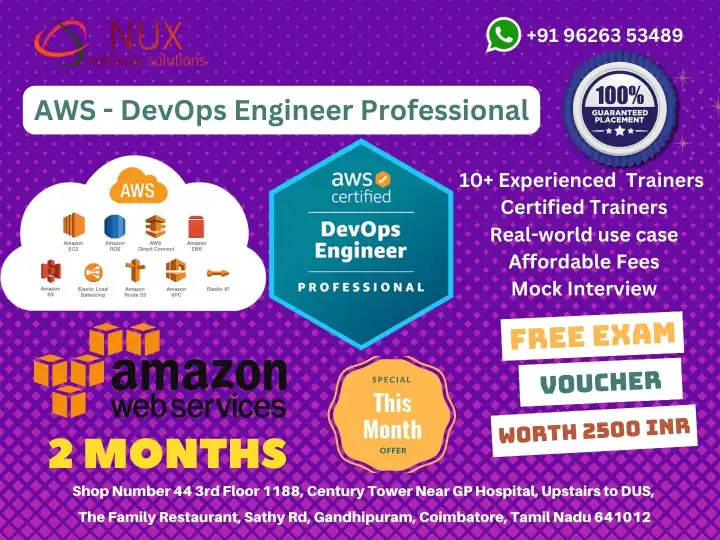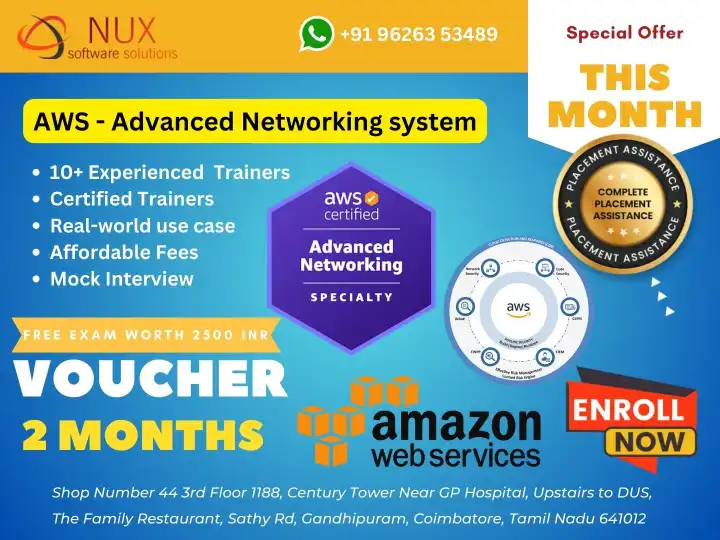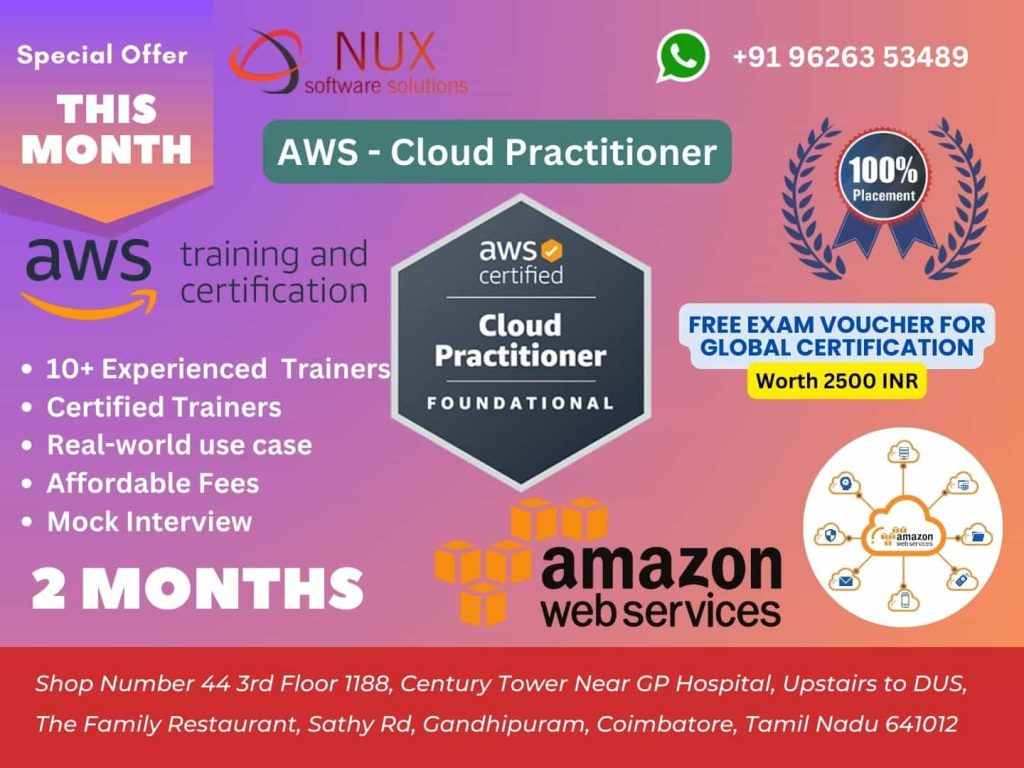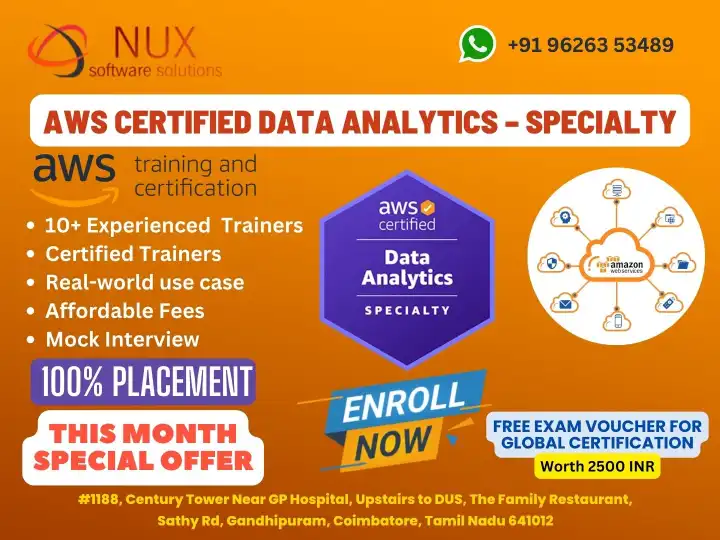AWS Certified DevOps Engineer – Professional (DOP-C02)

Best AWS certified devops engineer Course
The AWS Certified DevOps Engineer – Professional (DOP-C02) is a high-level certification that validates expertise in automating infrastructure, monitoring systems, managing CI/CD pipelines, and building secure, scalable operations on AWS. This course is designed for experienced DevOps professionals who want to master the tools, services, and processes that enable faster and more efficient software delivery using AWS.
At Linux Training Center in Coimbatore, our specialized training program offers real-world DevOps scenarios, hands-on labs, and detailed guidance to help learners become job-ready and certification-ready.
Whether it’s managing large-scale deployments with infrastructure as code, implementing automated testing workflows, or setting up monitoring and logging for production environments, this course prepares you to take full control of your DevOps lifecycle in the AWS ecosystem. With a curriculum aligned to the latest DOP-C02 exam objectives, you’ll gain confidence to work in high-availability, fast-paced cloud environments that demand operational excellence.
Who Should Enroll?
This course is ideal for DevOps engineers, cloud automation specialists, system administrators, release engineers, and software developers working in AWS environments who are looking to step into advanced DevOps roles. It’s also well-suited for professionals who hold the AWS Certified Developer – Associate or AWS Certified SysOps Administrator – Associate certifications and want to upgrade to the professional level.
What You Will Learn
You will learn to automate code deployments using AWS CodePipeline, CodeDeploy, and CodeBuild, manage infrastructure as code with tools like AWS CloudFormation and Terraform, monitor system health with CloudWatch and X-Ray, build scalable and resilient architectures using ECS, Lambda, and Auto Scaling, ensure compliance and governance with IAM and policies, and design continuous delivery workflows that align with DevSecOps and reliability engineering principles. Through project-based learning, you’ll also explore disaster recovery, performance tuning, and cost control within real AWS environments.
Prerequisites
A solid understanding of core AWS services and DevOps principles is required. Prior hands-on experience with Linux, scripting, CI/CD tools, containerization, and cloud monitoring will be highly beneficial. While not mandatory, having an associate-level AWS certification is strongly recommended before taking this course.
Course Benefits
Complete DOP-C02 exam coverage with scenario-based training, live projects with automation and pipeline configurations, full access to practice exams and lab guides, instructor-led sessions by AWS Certified DevOps Experts, and post-course job support with resume preparation and mock interviews.
Career Opportunities After Certification
This certification qualifies you for advanced roles such as AWS DevOps Engineer, Site Reliability Engineer, Cloud Automation Architect, Infrastructure as Code Specialist, and Cloud Operations Manager.
Join our AWS Certified DevOps Engineer – Professional (DOP-C02) course at Linux Training Center, Coimbatore, and elevate your career in cloud automation and DevOps engineering. With expert training, real-time labs, and focused exam preparation, we help you become a certified DevOps professional that top cloud employers are seeking.
Limited seats available – contact us now and secure your spot in the next batch.
AWS Certified DevOps Engineer - Professional Syllabus
Chapter 1
Chapter 2
SDLC Automation, Introduction, What is CI/CD?, AWS CodeCommit, AWS CodeBuild, AWS CodeDeploy, AWS CodePipeline, Testing, Artifacts, Deployment Strategies, HANDS-ON LAB Creating an AWS CodeCommit Repository That Triggers Email Notifications, HANDS-ON LAB Configure and Work with CodeCommit from the CLI, HANDS-ON LAB Setting Up an AWS CodePipeline with a Manual Approval
Implement CI/CD pipelines.
Knowledge of:
Skills in:
Chapter 3
Configuration Management and Infrastructure as Code, Introduction, AWS CloudFormation, AWS CloudFormation Lab, AWS CloudFormation Intrinsic Functions, AWS CloudFormation Wait Conditions, AWS CloudFormation Nested Stacks, AWS CloudFormation Deletion Policies, AWS CloudFormation Stack Updates, AWS CloudFormation Change Sets, AWS CloudFormation Custom Resources, AWS CloudFormation Custom Resources Lab, AWS Elastic Beanstalk, AWS Elastic Beanstalk Lab, AWS Elastic Beanstalk ebextensions, AWS Config, AWS Config Lab, Amazon ECS, Amazon ECS Lab, AWS Managed Services, AWS Lambda, AWS Lambda Lab, AWS Lambda Step Functions, AWS OpsWorks, AWS OpsWorks Lab, HANDS-ON LAB Working with CloudFormation Condition Functions, HANDS-ON LAB Working with CloudFormation Nested Stacks, HANDS-ON LAB Updating CloudFormation Stacks with Direct Updates and Change Sets
Integrate automated testing into CI/CD pipelines.
Knowledge of:
Chapter 4
Monitoring and Logging, Introduction, CloudWatch Overview, CloudWatch Lab, CloudWatch Custom Metrics, CloudWatch Events Lab, CloudWatch Logs Lab, AWS X-Ray and Lab, HANDS-ON LAB Monitoring AWS CodePipeline Changes Through AWS CloudWatch Events Rules
Build and manage artifacts
Knowledge of:
Chapter 5
Policies and Standards Automation, Introduction, AWS Service Catalog, AWS Trusted Advisor, AWS Systems Manager, AWS Organizations, AWS Secrets Manager, Amazon Macie, AWS Certificate Manager
Implement deployment strategies for instance, container, and serverless environments
Knowledge of:
Skills in:
Chapter 6
Incident and Event Response, Introduction, Amazon GuardDuty, Amazon Inspector, Amazon Kinesis
Define cloud infrastructure and reusable components to provision and manage systems throughout their lifecycle.
Knowledge of:
Skills in:
Chapter 7
High Availability, Fault Tolerance and Disaster Recovery, Introduction, AWS Single Sign-On, Amazon CloudFront, AutoScaling and Lifecycle hooks, Amazon Route53, Amazon RDS, Amazon Aurora, Amazon DynamoDB, Amazon DynamoDB Keys and Streams, HANDS-ON LAB Deploying an EC2 Instance Using Cross-Stack References
Deploy automation to create, onboard, and secure AWS accounts in a multi account/multi-Region environment.
Knowledge of:
Skills in:
Chapter 8
Other Services You Need to Know About, Introduction, Tagging, Amazon Elastic File System, Amazon ElastiCache, Amazon S3 Glacier, AWS Direct Connect, AWS Lambda Function Dead Letter Queues, Amazon CloudSearch, Amazon Elasticsearch Service, Amazon DynamoDB Accelerator, AWS Server Migration Service
Design and build automated solutions for complex tasks and large-scale environments
Knowledge of:
Chapter 9
Implement highly available solutions to meet resilience and business requirements.
Knowledge of:
Skills in:
Chapter 10
Implement solutions that are scalable to meet business requirements.
Implement automated recovery processes to meet RTO/RPO requirements.
Chapter 11
Monitoring and Logging
Configure the collection, aggregation, and storage of logs and metrics.
Chapter 12
Audit, monitor, and analyze logs and metrics to detect issues.
Automate monitoring and event management of complex environments.
Chapter 13
Incident and Event Response
Manage event sources to process, notify, and take action in response to events.
Implement configuration changes in response to events.
Troubleshoot system and application failures.
Chapter 14
Security and Compliance
Implement techniques for identity and access management at scale.
Apply automation for security controls and data protection.
Implement security monitoring and auditing solutions.
Conclusion



